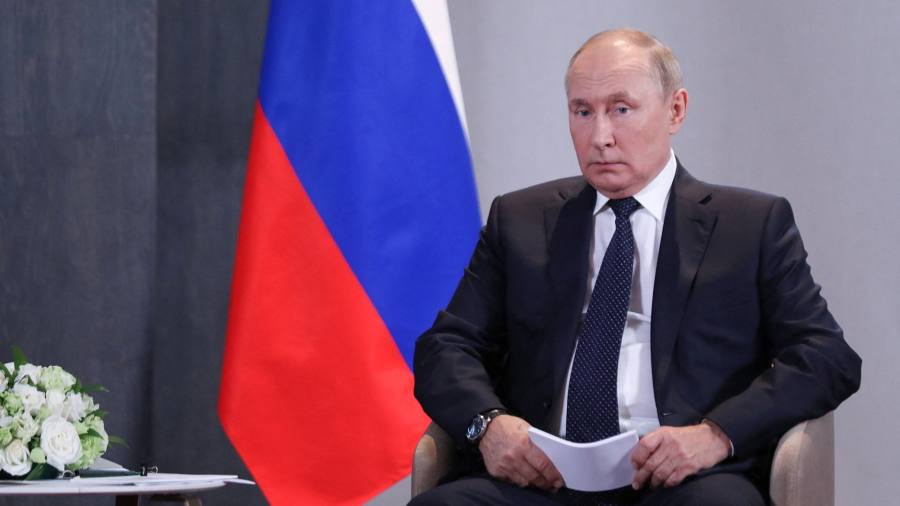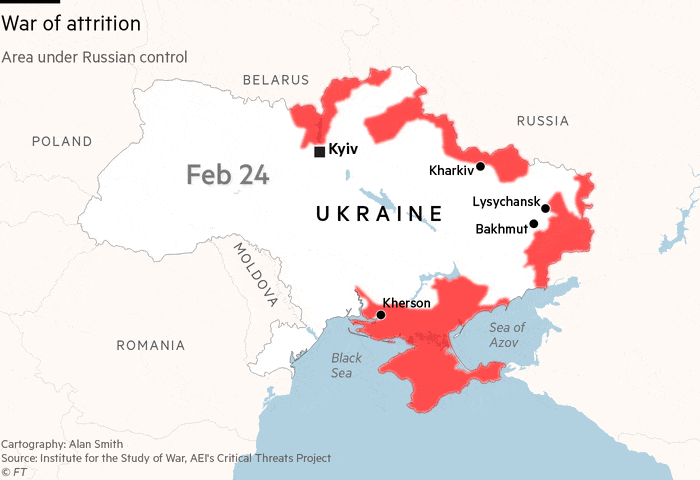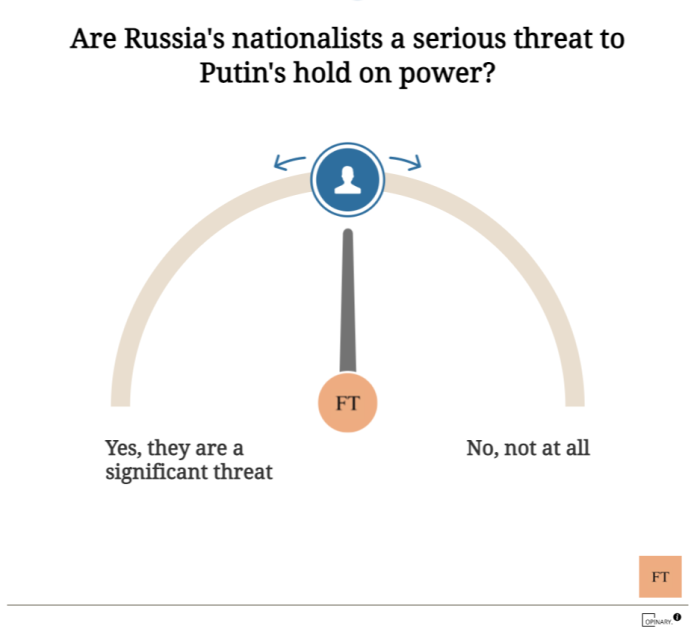
This article is an onsite version of our Europe Express newsletter. Sign up here to get the newsletter sent straight to your inbox every weekday and Saturday morning
Russia’s military reverses in Ukraine are stirring rage and frustration among hawkish nationalists at home. Does the hardliners’ discontent represent a serious threat to Vladimir Putin’s regime?
First, some housekeeping. I am away next week so the Saturday edition of Europe Express will be written by my colleague and FT Brussels bureau chief Sam Fleming. You can reach me at [email protected]. Following the Italian elections, the FT will host a virtual briefing for subscribers on September 27 to discuss what is next for the nation and Europe. Register for free today and submit your questions in advance for the panelists.
In western societies, there’s an understandable tendency to focus on Putin’s liberal antiwar critics. For sure, we can only respect their bravery.
Here are some examples:
Earlier this month, municipal lawmakers in Moscow and St Petersburg signed a petition calling for Putin’s resignation. The authorities are poised to shut down the St Petersburg district council where opposition surfaced.
Lev Karmanov, a Moscow voter, was arrested for painting a dove with the words “no to war!” on his ballot paper in a local election.
Polina Osetinskaya, a classical pianist, had her second concert in a week cancelled after she spoke out against the war. Liberal creative artists can expect worse to come: an ultranationalist group named Grad (“hail”) has emerged in the State Duma, or legislature, to crack down on “anti-Russian cultural activities”.
From a western point of view, the bitter truth is that liberals are a minority in Russia. Grigory Yudin, an eminent Russian political scientist, estimates that antiwar dissenters — not all of whom are liberals, anyway — account for about 20 to 25 per cent of public opinion.
Their influence is limited because “they are banned from Russian-based media and generally depressed”. For insights into the mood of Russian society, I encourage you to read Yudin’s illuminating Twitter thread in full.
By contrast, the hawks’ outrage at Russia’s retreat in north-eastern Ukraine is loud and fierce. In the view of Tatiana Stanovaya, another Russian political analyst, “the pro-war opposition could become one of the most serious challenges for the authorities since the defeat of the non-systemic [liberal] opposition”.
Nationalist attacks on Putin’s conduct of the war point to one of his main vulnerabilities — the myth, cultivated year by year after he came to power in 2000, of his almost superhuman invincibility.
They illustrate how the war is aggravating tensions in Russian society, including over support for Putin’s regime. Denis Volkov and Andrei Kolesnikov write for the Carnegie Endowment for International Peace:
All across Russia since February 24, old friends have fallen out; parents and children are no longer on speaking terms; long-married couples no longer trust each other; and teachers and students are denouncing each other.
Who are the hawks, and how big is their influence?
In the words of Alexey Kovalev, investigative editor at the Meduza news site:
[They are] a loose coalition — mostly active online — of far-right ideologues, militant extremists, veterans of the 2014 Donbas war, Wagner Group mercenaries, bloggers, war reporters running their own Telegram channels and individual Russian state media staff. Some are soldiers or mercenaries fighting in Ukraine.
Let’s be clear: the ferocity of Russia’s unprovoked invasion goes hand in hand with Putin’s intention to destroy Ukraine as an independent state in its internationally recognised borders. Doubtless it offends Ukrainians to draw a distinction between the Russian president and his inner circle, on one hand, and ultranationalist fanatics on the other.
However, Ekaterina Vinokurova, a writer for the Yarnovost website, says her contacts with the Russian authorities indicate that “there are many balanced people in the Kremlin . . . [who] treat radicals like a barking dog that should be on a leash”.
This applies to men like Igor Girkin — nom de guerre Strelkov, or “sharpshooter”. He is a Russian former intelligence operative who has never forgiven the Kremlin for cutting him loose after his role in fomenting Donbas separatism in 2014.
Girkin wanted Putin to implement the “Novorossiya” project, a vision of Russian-controlled Ukrainian territory stretching from Kharkiv to Odesa. He now berates the Kremlin for mishandling this year’s invasion.

The all-important question is the extent to which the hawks have connections and influence with the security and military officials who are, in the last resort, the people who keep Putin in power.
In an article for the Moscow Times, written a few weeks before the invasion, Mark Galeotti, a British expert on Russia’s security services, made this point:
There is . . . a strong strand of nationalist critiques of Putin that interconnects with elements of the systemic and non-systemic opposition, but also has a constituency within the security apparatus on which the Kremlin depends . ..
Scroll through their Telegram channels or some of the more recondite message boards and it soon becomes clear how strong the nationalist critique of the government can be, even within such bodies as the National Guard intended to be its bulwarks.”
In her forthcoming book Hybrid Warriors (which I shall review soon for the FT), the Russian-American author Anna Arutunyan makes a similar observation. She says key figures in the FSB intelligence agency and Russia’s wider security community were unhappy in 2014 with Putin’s reluctance to expand Russian support for the Donbas separatists.
What do you think? Are the ultranationalists a threat to Putin’s hold on power? Vote here.
Notable, quotable
“God is peace. He guides us always in the way of peace, never that of war” — Pope Francis, speaking at a world faith congress in Kazakhstan, takes apparent aim at Patriarch Kirill, the Russian Orthodox churchman who backs Putin’s invasion of Ukraine and boycotted the conference
Tony’s picks of the week
Recommended newsletters for you
Britain after Brexit — Keep up to date with the latest developments as the UK economy adjusts to life outside the EU. Sign up here
Working it — Discover the big ideas shaping today’s workplaces with a weekly newsletter from work & careers editor Isabel Berwick. Sign up here
Are you enjoying Europe Express? Sign up here to have it delivered straight to your inbox every workday at 7am CET and on Saturdays at noon CET. Do tell us what you think, we love to hear from you: [email protected]. Keep up with the latest European stories @FT Europe
